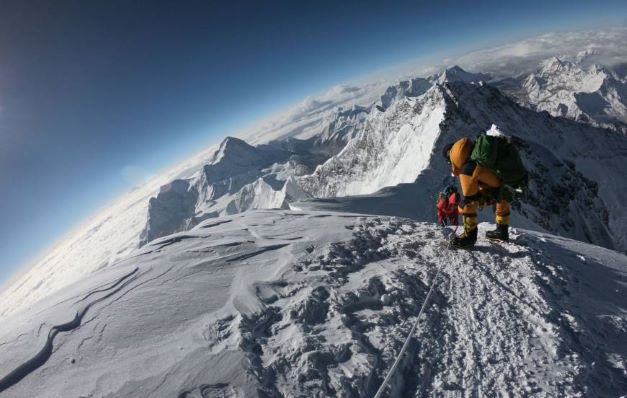

The Nepalese government this week finally concluded its clean-up drive of the Mount Everest and said that it has so far collected nearly 11 tonnes of trash that had piled up on the peak for decades.
The clean-up initiative, the first of its kind since Edmund Hillary and Tenzing Norgay Sherpa conquered the summit 66 years ago, was launched in mid-April and involved a team of 12 high-altitude Sherpa climbers who spent over a month collecting the waste.
[related_post]
“Along with the rubbish, they also collected four dead bodies from the high camps of Mount Everest that were brought to Kathmandu last week,” Dandu Raj Ghimire, the Director-General of Nepal’s Tourism Department, told local Nepalese media.
According to Mr Ghimire, the clean-up campaign cost nearly 23 million rupees. He added that China had also launched a similar drive to clean the north side of the world’s highest mountain, where it too confirmed to have removed 10 tonnes of rubbish from the mountain trail.
Ang Dorje Sherpa, the Chairman of the Sagarmatha Pollution Control Committee (SPCC), said around seven tonnes of waste had been collected from the Everest Base Camp and the high camps.
The other four tonnes were removed from the villages of Lukla and Namche Bazar, both of which are considered the gateway to Everest. Several tonnes of old equipment, oxygen cylinders, rubbish and human waste litter the famous mountain.
Hundreds of foreign mountaineers spend thousands of dollars to conquer the Mount Everest every spring season, which normally begins in early April and lasts until May. As they go on the dangerous climb, they leave behind a trail of litter.
The government every year collects over $3.55 million per year in revenue by issuing permits for climbers, but so far has spent very little to keep the mountain ecosystem clean.
In 2014, the government introduced a rule forcing each member of an expedition to bring back at least 8 kg of collected garbage, in addition to the trash they generate themselves.
Each expedition team has to deposit $4,000, which are refunded if each climber returns with the 8 kg of waste. The deposit is refunded only if the SPCC certifies that they have taken all their trash back down. But many commercial expeditions still end up leaving trash scattered among the gelid snow.
Pic Credit: Japan Times
Sustainability-focused venture builder Sustain Labs Paris (SLP) has collaborated with Posterity Institute and launched ‘SLP…
Japan’s trading giant Sumitomo Corporation has signed an MoU with Malaysian renewable energy conglomerate reNIKOLA…
Renewable energy conglomerate TotalEnergies has signed a Sale and Purchase Agreement (SPA) with HitecVision, a…
Nordic energy company Gasum has inaugurated its newest and largest biogas plant in the Swedish…
The Central Government has approved an additional allocation of 2.8 million tonnes of Food Corporation…
1. The mandate for blending Compressed Biogas (CBG) with natural gas has come into effect…